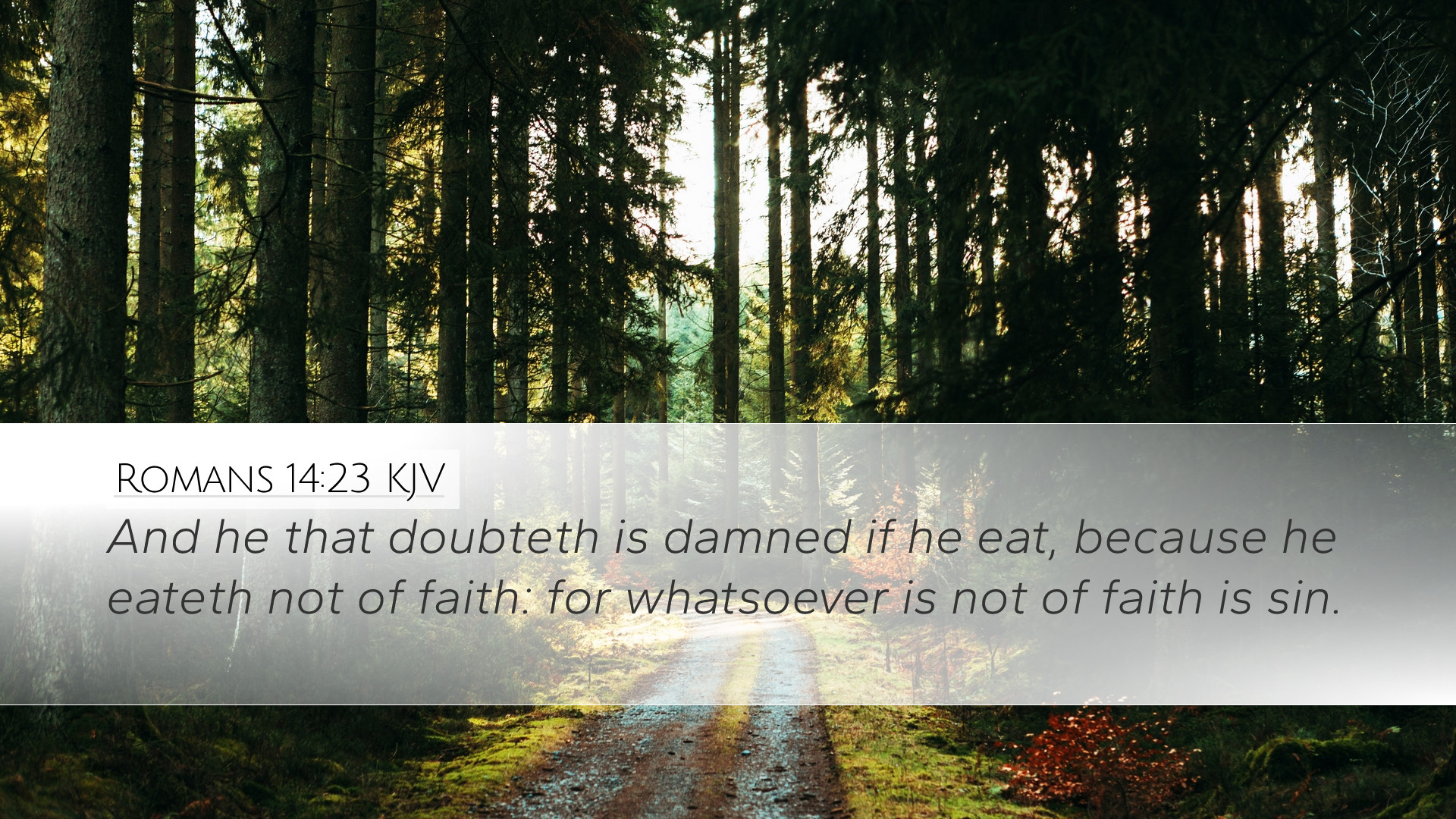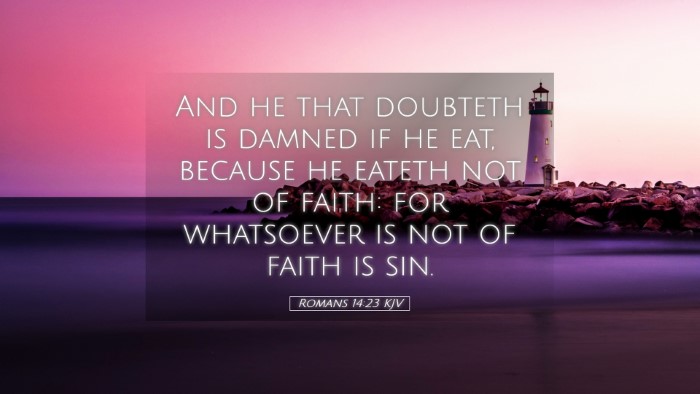Old Testament
Genesis Exodus Leviticus Numbers Deuteronomy Joshua Judges Ruth 1 Samuel 2 Samuel 1 Kings 2 Kings 1 Chronicles 2 Chronicles Ezra Nehemiah Esther Job Psalms Proverbs Ecclesiastes Song of Solomon Isaiah Jeremiah Lamentations Ezekiel Daniel Hosea Joel Amos Obadiah Jonah Micah Nahum Habakkuk Zephaniah Haggai Zechariah MalachiRomans 14:23
Romans 14:23 KJV
And he that doubteth is damned if he eat, because he eateth not of faith: for whatsoever is not of faith is sin.
Romans 14:23 Bible Commentary
Commentary on Romans 14:23
Verse: “But he that doubteth is damned if he eat, because he eateth not of faith: for whatsoever is not of faith is sin.”
Introduction
Romans 14 addresses the issue of Christian liberty, particularly regarding matters of conscience and the observance of dietary laws. In this verse, Paul emphasizes the importance of faith in all actions, particularly those that pertain to the Christian's liberty. The insights from various public domain commentaries provide a rich understanding of the theological and practical implications of this verse.
The Role of Doubt
Matthew Henry notes that doubt is a significant barrier to faith and action. When a believer engages in an action—such as eating—without the conviction of faith, they expose themselves to condemnation, as their act is not grounded in a trustful relationship with God. It is essential to discern that doubt reveals a conflict between a person's conscience and their actions, leading to spiritual peril.
Albert Barnes interprets that the phrase "he that doubteth" pertains to those who are uncertain about the propriety of their action. If one eats with doubt, the act is not deemed righteous in their own eyes, hence it results in condemnation—not necessarily from God, but from one's own conscience.
Faith and Its Necessity
Both Adam Clarke and Matthew Henry underscore the necessity of acting in faith. Clarke articulates that faith is the bedrock upon which Christian conduct should stand; without it, no action is legitimate. The principle Paul establishes here is a profound one: faith must underlie every action, particularly in matters where moral and spiritual ambiguity exists.
Barnes echoes this sentiment, stating that to act without faith is to act contrary to God’s will. Circumstances arising from doubt lead one to sin because such actions cannot please God. Thus, it is paramount for believers to examine, with diligence and prayer, the motivations behind their decisions.
Faith and Sin
The latter part of the verse—“for whatsoever is not of faith is sin”—is a critical theological point. Henry emphasizes that this statement broadens the understanding of sin beyond mere transgression of the law to include acts done without a firm basis in faith.
Clarke elaborates by stating that even the most seemingly insignificant actions become sinful when they are not performed from a standpoint of faith. This comprehensive view of sin serves as a reminder that the internal condition of the believer’s heart is as important as external actions.
Applications for Believers
From this exploration, several key applications arise:
- Examine Consciousness: Believers are encouraged to examine their motivations and actions to ensure they stem from faith.
- Freedom with Responsibility: Liberty in Christ should be exercised with caution, aware of how personal actions may impact the faith and conscience of others.
- Encourage Genuine Conviction: Pastors and leaders should foster an environment where believers feel free to act based on their conscience, possibly urging them toward a more profound personal faith.
Conclusion
Romans 14:23 compels believers to recognize the seriousness of engaging in any action—including eating—without absolute faith and conviction. This verse serves as a cornerstone for understanding Christian liberty and responsibility. By integrating the insights from public domain commentaries, students, theologians, and pastors can obtain a richer interpretation of this biblical command.
As believers strive to live in harmony with one another while holding true to personal convictions, seeking guidance from Scripture and the Holy Spirit remains essential. In encouraging each other in faith and love, the church can reflect the unity of the body of Christ.


